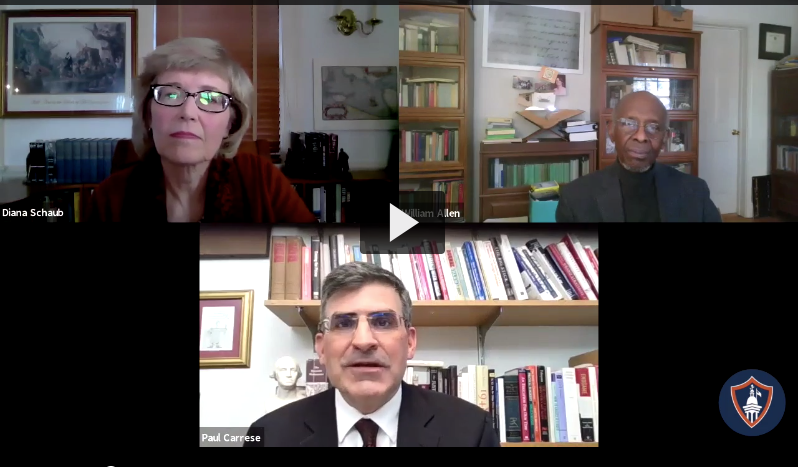
Faculty Research & Public Works
The School of Civic and Economic Thought and Leadership’s faculty members are bringing classroom learning to life through research and authorship of independent work, contributions to academic journals, public speaking, and much more. Additionally, many of our faculty contribute to work through the school’s two affiliated research centers. Explore the depth and breadth of our faculty’s most recent publications and ongoing research below.
Faculty Research
Article I of the United States Constitution
Janine Turner, Cathy Gillespie, and Constituting America’s Student Ambassadors, Tova Love Kaplan and Dakare Chatman, chat with Constitutional experts on hot-topic issues via Zoom!
Inside the Mind of James Madison
To celebrate Constitution Day, the Rutgers Law School chapter of the Federalist Society hosted Dr. Colleen Sheehan, one of the nation’s leading Madison scholars, to discuss the constitutional thought of James Madison and his role as the “Father of the Constitution.”
Saving the American Constitution
Someone recently asked me, “How can the Constitution save us?” My response was that it can’t. Rather, it is up to us to save the Constitution. The document we think of as the U.S.
Civic Friendship in America: A Madisonian Retrospective
Given the current and serious political polarization in America, we are compelled to ask whether a nation composed of citizens who disagree so deeply about fundamental principles can endure.
Mobs in America's Past and Present
A mob stormed the U.S. Capitol on January 6, leading to a ricochet of effects including the impeachment of President Trump.
"Cherokee Political Thought and the Development of Tribal Citizenship"
This piece uses a novel construction of Cherokee political thought as an analytical tool for identifying durable shifts in tribal citizenship law.
Who gets Cherokee citizenship has long been a struggle between the tribe and the US government
A recent decision by the Cherokee Nation’s Supreme Court struck down a law that freedmen – descendants of people enslaved by Cherokees in the 18th and 19th centuries – cannot hold elective tribal office. The ruling is the latest development in a long-standing dispute about the tribal rights available to Black people once held in bondage by Native Americans.
Case McGrit vs. Oklahoma: Compliance with Indigenous Treaties and Collective Titles To The Land
The present case is one of the most important of the modern period of the Supreme Court of the United States, which, defining criminal jurisdiction, establishes indigenous policies. The Supreme Court ruling in McGirt v.
Consent, Revolution, and the End of the World: America’s Apocalyptic Fixation as Politics
Featured work
Indelible Legacy: The Indispensable, Uncancelable Statesmanship of George Washington
Authors: William Allen and Paul O. Carrese
Today, statues and monuments of George Washington are under siege, chiefly because of his ownership of slaves. Does he in fact still deserve the honor and veneration of his countrymen? What sort of man was Washington, and what qualities in him made his achievements possible? Can those achievements be separated from his record as a slaveholder and as an ambitious man of affairs? What can we say of George Washington entire?
